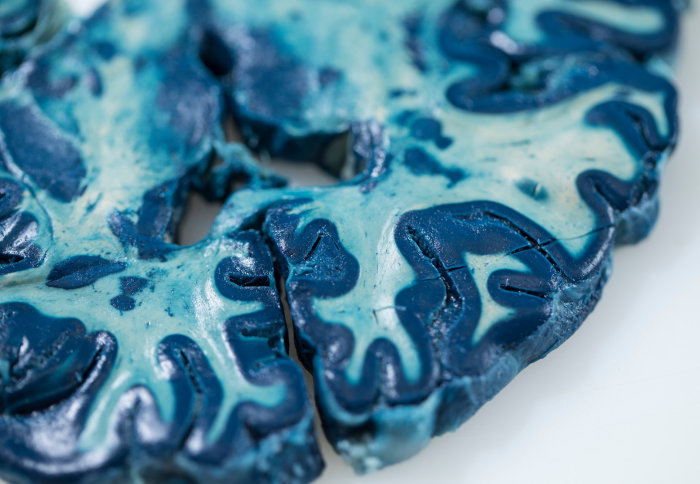Four ways Imperial is leading the fight against Parkinson’s

A brain specimen from Imperial's brain bank
In the lead up to World Parkinson’s Day on 11 April, we reflect on how Imperial scientists are advancing research to tackle the condition.
Parkinson's develops when cells in a specific part of the brain stop functioning properly and are lost over time. These cells produce a chemical called dopamine, which plays a crucial role in controlling how we move. Symptoms of Parkinson’s begin to appear when the brain cannot produce enough dopamine to regulate movement.
Parkinson’s is the fastest growing neurological condition in the world, with an estimated 145,000 people in the UK currently living with a diagnosis. According to analysis by the charity Parkinson’s UK, this number is likely to increase by a fifth by 2030 due to population growth and ageing.
Here are some of the ways researchers at Imperial are working to understand and find new treatments for Parkinson’s.
Collecting brain tissue to unearth new clues
 Imperial is home to the Parkinson's UK Brain Bank, the world's only brain bank solely dedicated to Parkinson's research. Based at the College’s Hammersmith Campus, scientists here collect tissue from people with and without the condition who have chosen to donate their brains to research. This vital tissue is supplied to researchers all over the world studying Parkinson's, multiple sclerosis and related conditions.
Imperial is home to the Parkinson's UK Brain Bank, the world's only brain bank solely dedicated to Parkinson's research. Based at the College’s Hammersmith Campus, scientists here collect tissue from people with and without the condition who have chosen to donate their brains to research. This vital tissue is supplied to researchers all over the world studying Parkinson's, multiple sclerosis and related conditions.
Recently, researchers at the brain bank have been raising awareness of how Parkinson’s research may be ‘at risk’ because of confusion and uncertainty around brain donation.
Trialling a surgical implant to prevent frequent falls
 Last year, a team from Imperial College London and Imperial College Healthcare NHS Trust were awarded £250,000 from the Medical Research Council (MRC) to trial a surgical implant that alters nerve activity. The implant, which is being tested in five patients at Charing Cross Hospital, could improve movement and reduce the number of falls in patients with advanced Parkinson’s.
Last year, a team from Imperial College London and Imperial College Healthcare NHS Trust were awarded £250,000 from the Medical Research Council (MRC) to trial a surgical implant that alters nerve activity. The implant, which is being tested in five patients at Charing Cross Hospital, could improve movement and reduce the number of falls in patients with advanced Parkinson’s.
Dr Yen Tai, one of the researchers leading the trial, explained: “Frequent falls are a common and disabling problem in advanced Parkinson’s, and can lead to patients being housebound.”
Developing diagnostic biosensors and understanding molecular drivers
 Thanks to a generous £1.63 million gift from Lily Safra and the Edmond J. Safra Foundation, two talented research fellows are leading pioneering new programmes of research into Parkinson’s.
Thanks to a generous £1.63 million gift from Lily Safra and the Edmond J. Safra Foundation, two talented research fellows are leading pioneering new programmes of research into Parkinson’s.
Dr Sarah Marzi, based at the UK Dementia Research Institute (DRI) at Imperial, is focussing on understanding the molecular causes of the condition in order to develop new, targeted therapies. At the UK DRI Care Research & Technology Centre, Dr Bing Li is developing biosensors capable of detecting Parkinson’s biomarkers in blood, to provide an accurate and cost-effective way of diagnosing the condition in its early stages.
Exploring the potential of deep brain stimulation
 Although deep brain stimulation is used as a treatment in around 300 Parkinson’s patients a year, scientists have previously been unsure as to why delivering these small electric pulses reduces slow movement, tremor and stiffness.
Although deep brain stimulation is used as a treatment in around 300 Parkinson’s patients a year, scientists have previously been unsure as to why delivering these small electric pulses reduces slow movement, tremor and stiffness.
Recent research by a team at Imperial’s Department of Brain Sciences suggests that the treatment boosts the number and strength of brain cell ‘batteries’ called mitochondria. These batteries in turn provide power to brain cells, which may help reduce problems with movement and tremors.
World Parkinson’s Day takes place on 11 April.
Article text (excluding photos or graphics) © Imperial College London.
Photos and graphics subject to third party copyright used with permission or © Imperial College London.
Reporter
Ms Genevieve Timmins
Academic Services